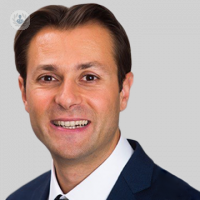Minimally invasive surgery in children
Written by:Minimally invasive surgery is the use of special instruments and techniques to reduce the size of incisions when performing an operation. It usually refers to laparoscopy or thoracoscopy, which are techniques using ‘keyholes’ in the tummy and chest, respectively. Paediatric surgeon Mr Stefano Giuliani tells us about the advantages of minimally invasive surgery for children and what to look for when choosing a surgeon to operate on your child.

Minimally invasive surgery uses techniques such as a thin camera (3mm or 5mm in diameter) and stick-like surgical instruments (3mm for babies) to go inside the tummy or chest to perform an operation. The camera transmits a good quality image to a screen, so the surgeon can watch this as they perform the surgery.
Two more keyholes are made by the surgeon, using different types of fine instruments to cut, hold, pull, separate and stitch tissues together. At the end of the surgery, the child will have tiny scars and minimal pain and can be discharged from the hospital much faster than if they had had a traditional surgery.
When do children need minimally invasive surgery?
Expert surgeons can use minimally invasive surgery for every operation. Mr Giuliani is an expert neonatal and paediatric minimally invasive surgeon and these are some of the operations that he routinely carries out using keyhole techniques:
- Inguinal hernia repair
- Acute appendicitis
- Hypertrophic pyloric stenosis (projectile vomiting in babies)
- Varicocele (dilated veins in the testis)
- Neonatal surgery (oesophageal atresia, duodenal atresia, congenital diaphragmatic hernia)
- Anti-reflux surgery ( Nissan fundoplication )
- Achalasia surgery (Heller-Dor myotomy)
- Chest operations
What are the advantages of minimally invasive surgery over open surgery for children?
Minimally invasive surgery has smaller scars and a better cosmetic outcome. The post-operative pain is significantly reduced and the child can often be discharged within 24 hours after the operation.
The return to normal life and physical activities is quicker than after open surgery and this is associated with missing fewer days at school. Whenever possible, an expert paediatric surgeon will offer minimally invasive surgery for your child’s surgical problem.
What are the risks?
The risks of minimally invasive surgery are similar to the ones of open surgery but with smaller wounds, so there’s a lesser risk of wound complications (infections and opening of the wounds).
What should I look for when choosing a surgeon for my child?
It is really important to choose a surgeon with high skills in minimally invasive surgery. First, the surgeon has to prove they have specialist training in keyhole surgery. Then you should understand how many keyhole operations the surgeon has performed on a specific condition and how many procedures the surgeon is performing weekly.
In the case of Mr Stefano Giuliani, he performs most of his operations with minimally invasive surgery and hundreds of routine and complex operations every year. Contact Mr Giuliani if you’d like more information regarding minimally invasive surgery and minimally invasive techniques.


